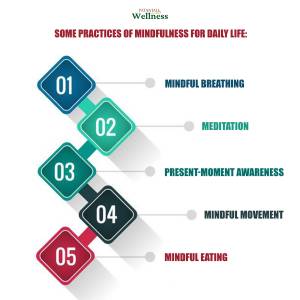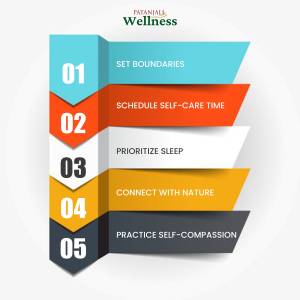Mental health has become one of the primary concerns of today’s generation, where there is a lot of chaos and turmoil. Ayurveda focuses on every aspect of health, i.e., physical, spiritual, and mental. It offers various approaches to maintaining a healthy mind, body, and soul.
This blog will find some Ayurvedic-proven ways to boost mental health and well-being. From ancient healing herbs to personalized lifestyle practices, Ayurveda provides a treasure trove of insights and techniques to help us attain inner harmony, manage stress, and cultivate emotional resilience.
Get ready to embark on a transformative journey as we unlock the secrets of Ayurveda’s therapeutic prowess and empower ourselves to embrace a life of serenity, clarity, and lasting mental health. Ayurveda brings various natural approaches, including herbal remedies and lifestyle modifications. Patanjali Wellness Center in Houston offers different Ayurvedic methods to boost mental health and well-being.
Let’s understand the mind according to Ayurveda.
According to Ayurveda, the mind plays an essential part in our body, which helps to maintain balance and harmony. In Ayurvedic philosophy, the mind is considered a subtle energy that interacts with the physical body and influences our thoughts, emotions, perceptions, and actions.
Ayurveda considers the mind as the prime factor of consciousness and identifies which is among the five “Mahabhutas” (ether, air, fire, water, and earth). The creation of the human body is known from the existence of Mahabhutas.
Ayurveda believes that the mind is controlled by the subtle energy known as “Prana,” which is responsible for the life force in the human body. When Prana is imbalanced, our body suffers from different stages of anxiety, stress, emotional imbalance, and disturbance in mental health.
Ayurveda understands that the mind and body are deeply interconnected and control each other. Therefore, Ayurveda principles and practices aim to create harmony within the mind and body to achieve optimal health. Through personalized lifestyle modifications, dietary choices, herbal remedies, meditation, and mindfulness practices, Ayurveda offers a holistic approach to nurturing the mind, fostering emotional well-being, and promoting overall mental health.
Practice Mindfulness
Mindfulness is practicing living in the present without worrying about the future or suffering from past traumas. It involves awareness of the present moment and surroundings, including feelings, sensations, and thinking. The practices allow individuals not to get too attached to material things; it involves observation of one’s thoughts and emotions.
Some practices of mindfulness for daily life:
- Mindful Breathing: Take some moments, at least 10 min in a day, to focus on your breath. Focus on the sensation while inhaling and exhaling, and let go of your stress and distractions while focusing only on your breath, i.e., in the present.
- Meditation: Meditation is the best practice for mindfulness, and if you want to work on your mental health, you have to take some time, no matter how busy you are. You can sit comfortably in a quiet place, focusing on your breath or a specific object, recite chants, or follow a guided meditation. Allow thoughts to come and go without judgment, gently bringing your focus back to the present moment.
- Present-Moment Awareness: Throughout the day, bring your attention to the present moment. Engage your daily activities with full awareness, whether eating, walking, thinking, or talking to someone. Figure out the sensations, thoughts, and emotions that arise without getting emotional.
- Mindful Movement: Mindfulness practices includes physical activities such as yoga, tai chi, or simply taking a mindful walk. Pay attention to the sensations in your body, the movement of your limbs, and the environment around you.
- Mindful Eating: Slow down and focus on each bite of your meals. Feel the flavors, textures, and smells of the food. Engage your senses fully and cultivate gratitude for the nourishment it provides.
Remember, following mindfulness practices daily will bring changes. Start with small changes daily and gradually increase the rules day by day. It can be your daily life routine if you want to transform your life in Ayurvedic procedures.
Nurture Positive Relationships
In the fast-growing technical world, it’s easy to stay connected through social media; however, we all know the impact of social connections over the internet. It is known that having a positive relationship with family, friends, or colleagues leads to a positive and healthier life.
Some tips for nurturing positive relationships
- Prioritize Quality Time: Set aside dedicated time to spend with your loved ones. Whether it’s a weekly dinner, a movie night, or a weekend outing, make an effort to connect and engage in meaningful activities together.
- Practice Active Listening: During conversations, focus on being fully present and actively listening to the other person. Show genuine interest, maintain eye contact, and avoid distractions. This fosters a more profound understanding and strengthens the bond between you and your loved ones.
- Express Gratitude and Appreciation: Show gratitude and appreciation for the people you have in your life or for having a new day with them. Acknowledge their contributions, support, and positive qualities. Simple acts of gratitude can go a long way in nurturing positive relationships.
- Communicate Openly and Honestly: Always try to create an environment of trust and open communication by expressing your thoughts, feelings, and needs honestly. Encourage others to do the same, creating a safe space for open dialogue and understanding.
- Set Boundaries: Establishing healthy boundaries is crucial for maintaining positive relationships. Communicate your limits and respect the boundaries of others. This helps prevent misunderstandings, reduces conflicts, and ensures mutual respect.
By implementing these tips, you can cultivate and nurture positive relationships, improving mental health and overall well-being for yourself and those around you.
Prioritize Self-Care
Prioritizing self-care means intentionally and consciously keeping yourself first and prioritizing your well-being in your life. It involves recognizing that your physical, mental, and emotional health is essential and deserves attention and care. It means taking time and space in your daily routine to engage in activities that nurture and replenish your mind, body, and spirit.
Some tips to prioritize self-care
- Set Boundaries: Learn to say no and keep yourself first. Avoid unnecessary commitments or something that is not in your favor. Set limits to your energy and time to ensure you have enough without hurting your self-care routine.
- Schedule Self-Care Time: Treat self-care as a non-negotiable appointment with yourself. Take time for regular exercise, nourishment, reading, or pursuing a hobby.
- Prioritize Sleep: Try to sleep 8 hours at least, which is necessary to boost your energy. Fix your bedtime, create a good aura, and be comfortable to get enough sleep.
- Connect with Nature: It’s better to go out into nature daily. You can take a morning walk, go hiking, or enjoy nature within your surroundings. Nature brings peace to mind, body, and spirit.
- Practice Self-Compassion: Be kind and gentle with yourself. Treat yourself with the same compassion and understanding you would do for your loved ones. Accept yourself and celebrate your strengths and accomplishments.
Remember, prioritizing self-care is a personal journey, which may look different for each individual. Find what works best for you and make self-care a routine.
Manage Stress Effectively
One key aspect of managing stress is developing self-awareness. Pay attention to your body’s responses to anxiety, such as muscle tension, changes in appetite or sleep patterns, or increased irritability. Identify the sources of stress in your life, whether work-related, personal, or environmental, and explore ways to address or minimize them. Managing stress effectively is very crucial.
Some tips for managing stress effectively
- Identify Your Stress Triggers: Recognize the specific situations, events, or thoughts that trigger stress. Awareness of your stressors is the first step in effectively managing them.
- Practice Stress Reduction Techniques: Explore and incorporate stress reduction techniques into your routine. These include deep breathing exercises, progressive muscle relaxation, meditation, mindfulness, yoga, or tai chi.
- Engage in Regular Physical Activity: Exercise has been proven to reduce stress and improve mood. Find physical activities you enjoy and make them a routine. Try at least 30 minutes of moderate exercise or just a morning work, will do for most days of the week.
- Prioritize Self-Care: Make self-care a priority. Perform those activities that bring joy, relaxation, and rejuvenation. Find what helps you to stay active and happy and make time for it.
- Establish Healthy Boundaries: Learn to say no when necessary and set boundaries to protect your time, energy, and well-being. Be realistic about what you can handle and delegate or ask for help when needed.
Cultivate a Growth Mindset
Cultivating a growth mindset can significantly impact maintaining good mental health. A mature perspective believes that our abilities and intelligence can be developed through dedication, effort, and learning from experiences.
Some ways to cultivate a growth mindset for better mental well-being:
- Embrace Challenges: Take challenges as an opportunity to learn new lessons in life rather than taking them as an obstacle. Challenges always come in the form of lessons, so learn from them and move on. Approach challenges with curiosity and a belief in your ability to understand and improve.
- Emphasize Effort and Persistence: Enjoy the journey rather than focus on the results. The journey will become enjoyable, and it will be easier to achieve your goals. Take setbacks and failures are part of the learning process and use them as opportunities to reassess, adjust, and try again.
- Foster a Love for Learning: Learning should not stop in our entire life. Develops a new passion occasionally, learns those skills, and enjoys it. Try to keep a positive mindset, learning should be continued.
- Shift from Judgment to Curiosity: Instead of self-judgment and criticism replace it with curiosity and self-reflection. Stop criticizing yourself for mistakes or shortcomings, and ask yourself what you can learn from the experience and how to improve.
- Cultivate a Positive Mindset: Train your mind to focus only on positive aspects and possibilities. Practice gratitude, celebrate achievements (both big and small), and surround yourself with positive minds and supportive people who embrace your growth.
Conclusion:
The above-mentioned practical tips will help to boost mental health and well-being. Although every individual’s mental health may vary from person to person, these are the most common tips that can be followed quickly and create a solid foundation for overall well-being.
To follow Ayurvedic procedures for good mental health, you can consult Patanjali Wellness Center in Houston; they have a team of Ayurvedic professionals who will guide you throughout your wellness journey.








